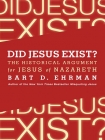Did Jesus Exist? - The Historical Argument for Jesus of Nazareth Bart Ehrman (books to read in your 20s txt) 📖

- Author: Bart Ehrman
Book online «Did Jesus Exist? - The Historical Argument for Jesus of Nazareth Bart Ehrman (books to read in your 20s txt) 📖». Author Bart Ehrman
The Essenes
Ironically, the one Jewish group from Jesus’s day that we are best informed about happens to be the one that is not mentioned in the New Testament. We know about the Essenes from Jewish writers such as Josephus but even more important from an entire library of their own writings first discovered by pure serendipity by a wandering shepherd boy in 1947. These are the famous Dead Sea Scrolls, a collection of writings from roughly the time of Jesus and the preceding years that was apparently produced by and for Essenes. One group of Essenes lived in a monastic-like community in a place known as Qumran, just west of the northern part of the Dead Sea in what is now Israel.6
A number of different kinds of books are found among the Dead Sea Scrolls. Some are copies of the Hebrew Bible (older by a thousand years than the copies we had prior to the 1947 discovery); others are commentaries on scripture that indicate that the predictions of the prophets were coming true in the community’s own day; others are books of hymns and psalms used in community worship; others are apocalyptic descriptions of what will happen in the end times; others are manuals that describe and prescribe the behavior of members of the community in their social and religious lives together. I should stress that nothing in the Dead Sea Scrolls is directly related to Christianity: Jesus is not mentioned in the scrolls; neither is John the Baptist or any of the early followers of Jesus. The Dead Sea Scrolls are Jewish books through and through, with nothing Christian in them. But they are invaluable for understanding Jesus and his early followers because they are writings produced in Jesus’s own day, or in the years immediately preceding, by Jews living in approximately the same location.
The term Essene never occurs in the Dead Sea Scrolls. But Qumran was located precisely where other ancient sources indicated that there was an Essene community, and the writings of the scrolls coincide well with what we otherwise know about the Essenes. Jews in this community were in serious conflict with both Pharisees and Sadducees. They believed that all other Jews were corrupt and had misunderstood and misapplied the Jewish Law, to the degree that they had defiled the Temple and rendered the worship of God there invalid. To preserve their own holiness, this particular group of Essenes (there were other Essenes, but we know less about them) went off into the wilderness to live a rather monastic life together, maintaining their own purity, removed from the impurity of Jewish society at large.
In no small part they did so because they believed they were living at the end of the age. God would soon send two messiahs to deliver his people, one a priest who would instruct all the faithful about how to follow God’s law and the other a political leader who would run the civic affairs of the people. In the view of the Essenes, a massive war was soon coming in which God and his people would emerge triumphant over the filthy Romans, and God’s kingdom would then come to earth.
Jesus himself was not an Essene. Nothing connects either him or John the Baptist to the group. In fact, just the opposite. John, as we will see, was concerned not with preserving his own purity but with preaching repentance to sinners to get them to turn from their wicked ways. And Jesus scandalized the highly religious Jews invested in maintaining pure lives removed from the uncleanness of the world around them because he preferred to associate with sinners, just the opposite of the Essenes at Qumran. But Jesus did have something in common with them. He too thought the end of the age was imminent and that God would soon set up his kingdom on earth.
The Fourth Philosophy
The final group of Jews mentioned by Josephus is not given a name. He calls it simply the Fourth Philosophy (to differentiate it from the other three). But its overarching views are clear and unambiguous. This was a group made up of Jews who thought that the Roman overlords had wrongfully taken possession of the Promised Land. This group—or these groups, all lumped together by Josephus—believed that God wanted them to take up the sword to oppose the Romans and foment a political and military revolt. This was not a secular movement; it had deep religious roots. In the view of those who adhered to this philosophy, God himself had called for action, and just as he had driven out the foul Canaanites from the land under the leadership of Joshua in the Hebrew Bible (see the book of Joshua), so he would do it again in their own day. God would fight for the faithful Jews, and he would reinstate Israel as a sovereign state in their own land ruled by his own chosen one.
Members of this Fourth Philosophy, then, were not ultimately concerned about the oral laws being developed by the Pharisees to help them keep the commandments of Moses in precise detail, and they did not care about maintaining their own ritual purity in the face of the uncleanness of the world around them, like the Essenes. They were especially opposed to Sadducees, who were seen as collaborators with the foul Romans who had devastated the land and taken what was not theirs. The chief focus of this Fourth Philosophy was, in fact, the land, promised to Israel by God. The land needed to be retaken, and it was to happen as it had in days of old, by military force.
Some scholars, as I have pointed out, thought that Jesus too preached an armed rebellion against the Romans. But that does not seem to be the dominant theme throughout the earliest traditions we have about him. It is not that Jesus was a collaborationist like the Sadducees. Quite the contrary, he too opposed both them and their Roman masters. But





Comments (0)